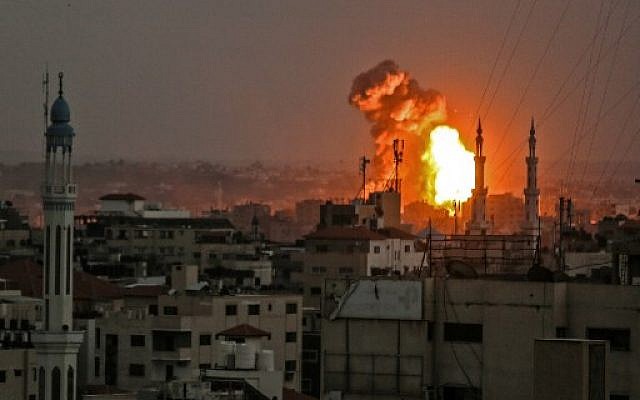Hamas said on Saturday it had agreed to a ceasefire in Gaza after a day of violence claimed the lives of an Israeli soldier and four Palestinians The late-night ceasefire brokered by Egyptian intelligence was announced by local Gazan media.
Israel launched air strikes on what it said were military targets in response to the soldier’s death. Gaza residents reporting explosions in the south of the blockaded coastal enclave and Hamas said four Palestinians were killed in the attacks. Hamas fired rockets and mortars towards Israel until the ceasefire came into effect. The soldier, who has not been named, was the first Israeli death reported since mass protests began along the border fence at the end of March. Since then Israeli snipers have killed more than 130 Palestinians and shot thousands more.
“What we see is a cumulative effect of violence, led, funded and organised by Hamas which have escalated in the last few weeks,” said Israel Defence Force lieutenant colonel Jonathan Conricus. “With Egyptian and United Nations efforts it has been agreed to return to the era of calm between [Israel] and Palestinian factions,” Fawzi Barhoum, spokesman for the Hamas Islamist group that controls Gaza, told Reuters.
Israel has blockaded the enclave for more than a decade, trapping some 2m Palestinians inside a 23km-long strip of land. Trade with the outside world has largely collapsed since then, forcing many to rely on international food aid. Israel also controls the airspace and limits how far fishing boats can venture into the Mediterranean. Egypt joined the blockade after a coup ousted an Islamist government in Cairo in 2013.
Egypt hopes to dislodge Hamas and replace it with the more secular Fatah movement that controls the West Bank. amas is considered a terrorist group by Israel, the US and the EU. But Israel and Egypt, which serves as an intermediary and has helped broker at least three ceasefires with Hamas this year, have struggled to rein in the mass protests, which started with tens of thousands of mostly peaceful Palestinians gathering near the border fence every Friday.
Israeli officials, worried about attempts to breach the border and enter Israel, positioned nearly a hundred snipers along the fence who open fire regularly on the crowds. Israel said it only targeted those it felt were a threat to the fence or Israeli security, but eyewitnesses, human rights groups and journalists have documented dozens of cases where unarmed people have been shot, including a nurse, several Palestinian reporters and some young men who were shot in the back. Those protests were followed by a ritual of balloons, kites and helium-filled condoms fitted with burning strips of cloth or small Molotov cocktails being set adrift from inside the Gaza Strip and carried into Israel on inland breezes. They started hundreds of fires and destroyed thousands of acres of forest and farmland in Israel. Rockets or mortars fired from inside Gaza hit a synagogue last week, injuring three.
Hardline Israeli cabinet ministers have demanded that the children and teenagers launching balloons be killed. Instead, the IDF has built pressure on Hamas throughout the last fortnight, striking military targets every time a balloon causes a fire on the Israeli side. Last Saturday, the IDF carried out the widest range of air strikes since the 2014 war. That appeared to have worked until the killing of the soldier last evening, with fewer balloons or fires reported Friday.
“Everyone in Gaza needs to step back from the brink,” tweeted UN Middle East envoy Nickolay Mladenov, who is among those attempting to broker a ceasefire. “Not next week. Not tomorrow. Right NOW! Those who want to provoke Palestinians and Israelis into another war must not succeed.”
The Financial Times

